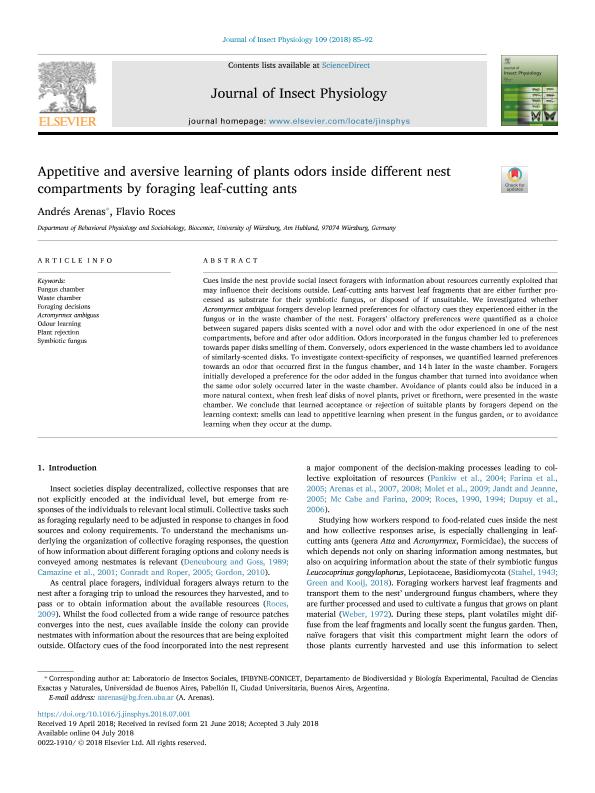Artículo
Appetitive and aversive learning of plants odors inside different nest compartments by foraging leaf-cutting ants
Fecha de publicación:
08/2018
Editorial:
Pergamon-Elsevier Science Ltd
Revista:
Journal of Insect Physiology
ISSN:
0022-1910
Idioma:
Inglés
Tipo de recurso:
Artículo publicado
Clasificación temática:
Resumen
Cues inside the nest provide social insect foragers with information about resources currently exploited that may influence their decisions outside. Leaf-cutting ants harvest leaf fragments that are either further processed as substrate for their symbiotic fungus, or disposed of if unsuitable. We investigated whether Acromyrmex ambiguus foragers develop learned preferences for olfactory cues they experienced either in the fungus or in the waste chamber of the nest. Foragers’ olfactory preferences were quantified as a choice between sugared papers disks scented with a novel odor and with the odor experienced in one of the nest compartments, before and after odor addition. Odors incorporated in the fungus chamber led to preferences towards paper disks smelling of them. Conversely, odors experienced in the waste chambers led to avoidance of similarly-scented disks. To investigate context-specificity of responses, we quantified learned preferences towards an odor that occurred first in the fungus chamber, and 14 h later in the waste chamber. Foragers initially developed a preference for the odor added in the fungus chamber that turned into avoidance when the same odor solely occurred later in the waste chamber. Avoidance of plants could also be induced in a more natural context, when fresh leaf disks of novel plants, privet or firethorn, were presented in the waste chamber. We conclude that learned acceptance or rejection of suitable plants by foragers depend on the learning context: smells can lead to appetitive learning when present in the fungus garden, or to avoidance learning when they occur at the dump.
Archivos asociados
Licencia
Identificadores
Colecciones
Articulos(IFIBYNE)
Articulos de INST.DE FISIOL., BIOL.MOLECULAR Y NEUROCIENCIAS
Articulos de INST.DE FISIOL., BIOL.MOLECULAR Y NEUROCIENCIAS
Citación
Arenas, Andres; Roces, Flavio; Appetitive and aversive learning of plants odors inside different nest compartments by foraging leaf-cutting ants; Pergamon-Elsevier Science Ltd; Journal of Insect Physiology; 109; 8-2018; 85-92
Compartir
Altmétricas




